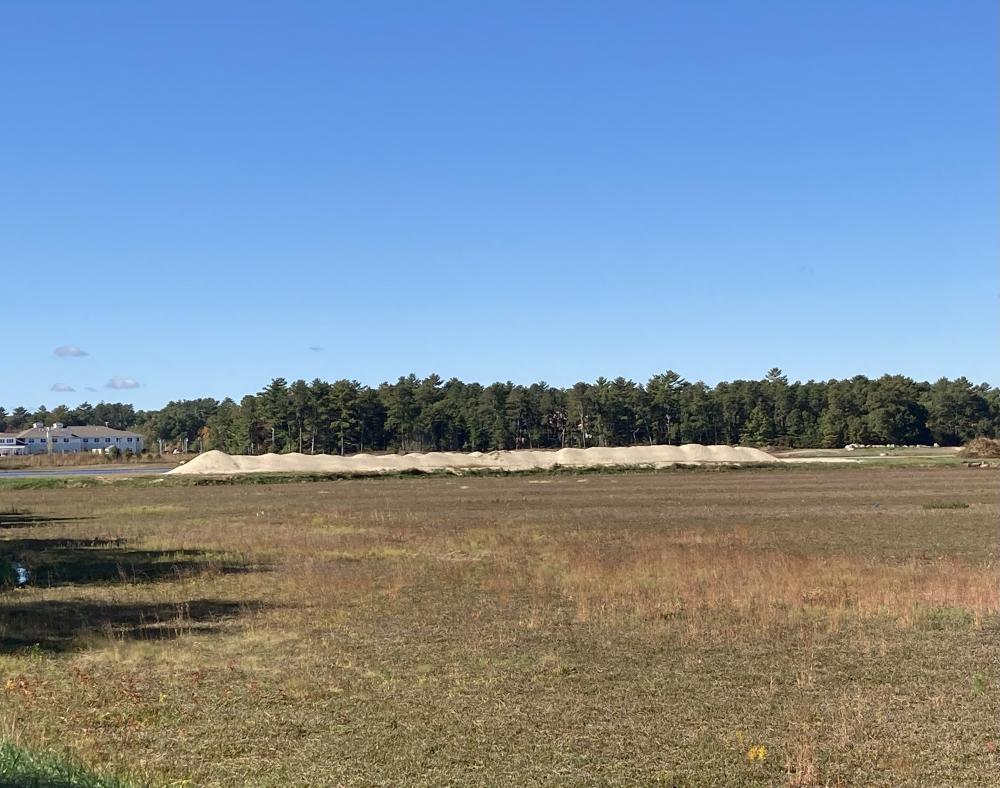Earth removal petition article, explained
For years, citizens in Wareham have been told that the town needs to increase revenue, and resident Barry Cosgrove thinks he just might have a solution.
Cosgrove is the lead petitioner for Article 18 on the Town Meeting warrant. The article would urge the Select Board to audit the A.D. Makepeace Company’s past and present earth removal operations and, if needed, enforce the town’s earth removal regulations.
In most instances, if earth is removed from town, entities are supposed to clear that removal with the Select Board, obtain a permit and pay the town 25 cents (or more) per cubic yard removed. There are some exemptions to the bylaw that allow earth removal without a permit, such as for “normal construction, maintenance or improvement of land in cranberry related activities or other agricultural use.” (See the town’s earth removal bylaws attached to this story as a PDF.)
When asked why he brought the petition forward, Cosgrove identified two primary reasons.
“The town has repeatedly communicated that it has substantial financial challenges, so it seems to me the town should be exploring every revenue option available to it,” Cosgrove explained. “Secondly, the town has an earth removal problem.”
In addition to the earth removal fees, the town could be entitled to compensation for each time the bylaw was violated: $50 for the first offense, $100 for the second offense and $200 for each subsequent violation (any size truckload of earth removed would constitute a separate offense).
The petition article specifically identified four addresses at which A.D. Makepeace is developing solar fields: 160 Tihonet Rd., 71 Charlotte Furnace Rd., and 64 and 77 Farm to Market Rd.
Those sites have been controversial, with conservation activists decrying the environmental impact of clear-cutting forest and removing earth to install solar panels.
Cosgrove said that he simply identified four locations at which it was “abundantly clear that massive amounts of sand had been removed” in the petition article. Those locations happen to be owned by the same company — A.D. Makepeace — but Cosgrove advocated for the town to enforce its earth removal bylaws across the board with any company.
In a statement, the A.D. Makepeace Company said the article was unnecessary. (For the full-length statement, see attached PDF).
“There is no need for a vote of Town Meeting on this warrant article to tell town officials what to do — previous Town Meeting voters created an earth removal bylaw for that purpose,” the statement said. “The fact is that we live within applicable regulations and our farming rights under state law. The repeated implication we do not is unfair, inaccurate and inappropriate.”
The company said complaints regarding earth removal practices have been filed with various state and local boards, including boards in Wareham and Carver. “None of these entities have found any issues with the company’s operations,” it said.
Cosgrove argued that the town typically asks for documentation that proves eligibility when someone applies for special exemptions. For example, he said, those who wish to opt-out of the town’s mandatory trash program because they have other means with which to dispose of their trash must provide proof of those means.
“When it comes to earth removal, they don’t even ask,” Cosgrove said, emphasizing that the town should require people prove that they qualify for the exemptions that would allow them to remove earth, permit-free.
Voting to support the petition article would call upon the Select Board to determine the number of cubic yards of earth removed from all A.D. Makepeace properties where earth removal has taken place. The petition also requires the town to calculate any earth removal fees and penalties that may be owed to the town.
The bylaw provides the mechanism to take this action, Cosgrove said, pointing to a line which states: “In the event that an earth removal project has begun without a permit, the Town’s engineer shall, at the property owner’s expense, determine the number of cubic yards removed without a permit in order to assess the number of offenses.” (Division 4, article 3, section 3, part H, line 5 of the bylaw).
Cosgrove said the article is meant to be a referendum or call to action for the Select Board. He described it as “a civil first step to nudge the selectmen to wake them up.”
The Select Board voted 4-1 against recommending this article. Cosgrove also noted that Fourth Amendment (which protects Americans’ homes and properties from illegal searches and seizures) concerns Select Board member Peter Teitelbaum raised about this article during an Oct. 12 meeting were “inaccurate in the extreme.”
Cosgrove said that engineers routinely conduct remote analysis of topography changes to estimate how much earth has been removed from a site, if any. For that reason alone, no illegal searches would be needed.
The Finance Committee voted unanimously (6-0) against recommending this article. Chair Bernie Pigeon said the committee was concerned that identifying A.D. Makepeace Company within the text of the article calls into question the legality of the article.
Residents who wish to vote on the earth removal petition should gather at Wareham High School at 7 p.m. on Oct. 25 for Town Meeting.
“If Millie, the 80-year-old, is looking for a break on her property taxes, she has to provide documents to prove (her eligibility), and if this is true for a senior on a fixed income, it should be true for (industrial earth removal operations),” Cosgrove said.















